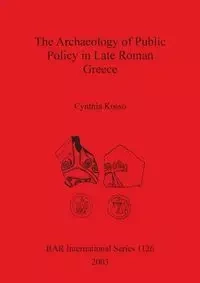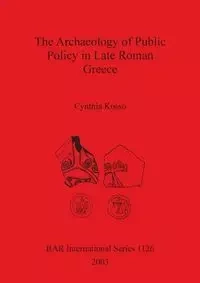The Archaeology of Public Policy in Late Roman Greece - Cynthia Kosso
This study looks at Greece (or the province of Achaia) during the period of Late Roman Antiquity with regards to new evidence, both textual and physical, as well as new archaeological opinion. Kosso is concerned with how Roman colonialism and imperialism affected the conquered Greek economy. This study is particularly interested in how this new information sheds light on the imposed socio-economic patterns in Greece during this period. Kosso looks at evidence for imperial policies from literary sources,and also states how the main basis for economic and social life for Roman citizens was land. Classical rhetoric is looked at, as well as Roman and Greek historians of the time, but more importantly Roman law and tax legislation give an excellent source of evidence for economic, social and agricultural policies. This evidence suggests that the imperial government widely encouraged the cultivation of rural areas, giving special attention and protection to small landholders. Archaeological evidence is used in this study to illustrate the transition in settlement patterns in Achaia during the Late Roman Period. The surveys in this study show how there was a change from large, less-intensely farmed agricultural estates, to smaller, more-intensively farmed isolated farmsteads. This would suggest that land became more widely owned and accessible at this time, with an increase in overall settlement patterns, especially in the rural areas. Kosso states how during this period there was an increase in population, urbanisation, and market demand, but she also states that these would have changed the nature of the Greek countryside only in conjunction with Imperial public policies. The literary evidence of a policy to increase cultivation is backed up by a decentralisation and subsequent intensification of land use. Kosso concludes that in Late Roman Greece, and in the Late Empire as a whole, the government implemented policies that would control elite landowners and local government/officials, but also protect small landowners, discouraging patronage due to its almost slave-like nature. Therefore this study helps us to better understand the connection between the Late Roman Imperial centre and source of legislature, and the surrounding provinces. Fundamentally it can be seen how Late Roman Imperial policy had a major impact on the landscape and demographics of the entire empire.
EAN: 9781841715025




This study looks at Greece (or the province of Achaia) during the period of Late Roman Antiquity with regards to new evidence, both textual and physical, as well as new archaeological opinion. Kosso is concerned with how Roman colonialism and imperialism affected the conquered Greek economy. This study is particularly interested in how this new information sheds light on the imposed socio-economic patterns in Greece during this period. Kosso looks at evidence for imperial policies from literary sources,and also states how the main basis for economic and social life for Roman citizens was land. Classical rhetoric is looked at, as well as Roman and Greek historians of the time, but more importantly Roman law and tax legislation give an excellent source of evidence for economic, social and agricultural policies. This evidence suggests that the imperial government widely encouraged the cultivation of rural areas, giving special attention and protection to small landholders. Archaeological evidence is used in this study to illustrate the transition in settlement patterns in Achaia during the Late Roman Period. The surveys in this study show how there was a change from large, less-intensely farmed agricultural estates, to smaller, more-intensively farmed isolated farmsteads. This would suggest that land became more widely owned and accessible at this time, with an increase in overall settlement patterns, especially in the rural areas. Kosso states how during this period there was an increase in population, urbanisation, and market demand, but she also states that these would have changed the nature of the Greek countryside only in conjunction with Imperial public policies. The literary evidence of a policy to increase cultivation is backed up by a decentralisation and subsequent intensification of land use. Kosso concludes that in Late Roman Greece, and in the Late Empire as a whole, the government implemented policies that would control elite landowners and local government/officials, but also protect small landowners, discouraging patronage due to its almost slave-like nature. Therefore this study helps us to better understand the connection between the Late Roman Imperial centre and source of legislature, and the surrounding provinces. Fundamentally it can be seen how Late Roman Imperial policy had a major impact on the landscape and demographics of the entire empire.
EAN: 9781841715025

